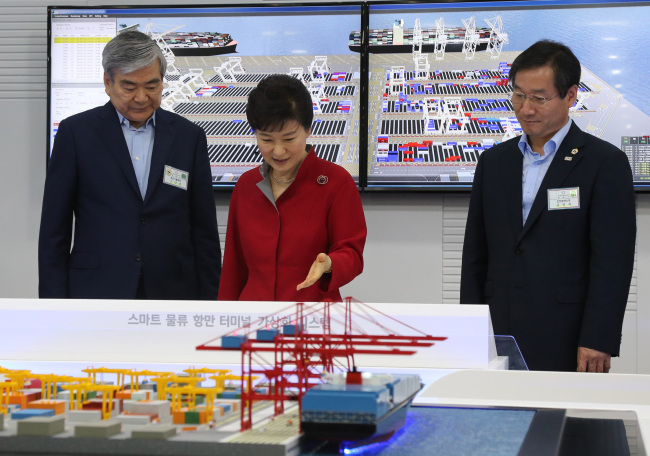South Korea’s Hanjin Group and the Ministry of Science, ICT and Future Planning opened a new creative economy innovation center in Songdo, Incheon, on Wednesday, in a bid to nurture new venture firms specializing in IT-based distribution system development and to aid their global expansion.
The Incheon Creative Economy Innovation Center is the last of 17 such centers launched nationwide by conglomerates in collaboration with the Science Ministry, in line with the Korean government’s flagship creative economy policy.
 |
President Park Geun-hye (center), Hanjin Group chairman Cho Yang-ho (left) and Incheon Mayor Yoo Jeong-bok look around the newly-opened Incheon Creative Economy Innovation Center in Songdo on Wednesday. (Yonhap) |
“The government hopes the center will successfully combine Incheon’s excellent distribution infrastructure and geographic advantage with the expertise of global distribution strong house Hanjin to elevate Korea’s small and venture businesses globally,” said President Park Geun-hye in her congratulatory speech at the center’s opening ceremony in Incheon.
The new Incheon center will mainly focus on helping small venture firms develop smart distribution management systems and attract new investments.
Smart distribution management system development refers to the fusion of IT -- including Internet of Things, smart sensors and big data management technologies -- and distribution infrastructure to optimize distribution networks and operations.
Hanjin Group, the owner of Hanjin Shipping and Korean Air, will lead the way in combining its distribution system expertise with experienced tech firms like Cisco Systems, as well as global start-up accelerator SparkLabs.
The creative economy innovation center in Incheon will operate a consulting center which will act as platform for larger, experienced firms to provide industry-specific support and technology management services to up-and-coming start-ups.
As a test project, Hanjin, 3-D control solution developer Rokwon IT and CyberLogitek are currently working to build a new automated 3-D container terminal system by next year, which enables the operator to monitor and efficiently manage all the terminal’s distribution networks in realtime.
To nurture new firms in the airplane engine repair services and automobile parts sectors, Korean Air, POSCO and other related institutions will offer one-on-one mentoring programs to the venture companies at the center.
Experts from Hanjin and the Korea Customs Service will also help small- and medium-sized firms develop tailored solutions to key issues such as optimizing customer support, reducing costs, taking advantage of free trade agreements and maximizing operational efficiency.
In particular, Hanjin will join hands with the Korea Agro-Fisheries & Food Trade Corp. to launch a special support facility for small-sized fresh food exporters.
The two firms have pursued a successful cooperative relationship in the past, expanding the annual export of homegrown king oyster mushrooms to Europe from 93 tons in 2012 to 1,048 tons 2014, according to Hanjin.
Moreover, the new Incheon center is set to serve as a platform to accelerate mutual exchange and cooperation between Korean and Chinese start-ups.
It will also aim to support new businesses looking to tap into China’s burgeoning online shopping market, offering tailored support across a range of fields including product selection, overseas shipping, customer management and online shopping mall operations.
The Korean government plans to inject about 159 billion won ($138 million) into funding the various programs and initiatives to be pursued by the Incheon Creative Economy Innovation Center, according to the ICT Ministry.
“The nation’s last creative economy innovation center has been launched in Incheon,” said President Park Wednesday, expressing hope that “each center, by combining each region’s unique strengths with corporate expertise, will help lead the government’s creative economy drive.”
By Sohn Ji-young (
jys@heraldcorp.com)








![[Today’s K-pop] Blackpink’s Jennie, Lisa invited to Coachella as solo acts](http://res.heraldm.com/phpwas/restmb_idxmake.php?idx=644&simg=/content/image/2024/11/21/20241121050099_0.jpg)